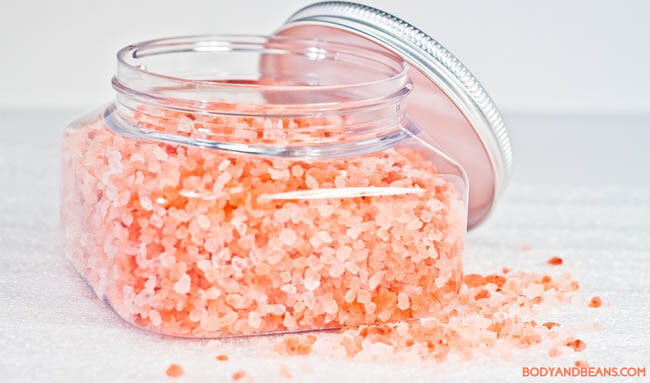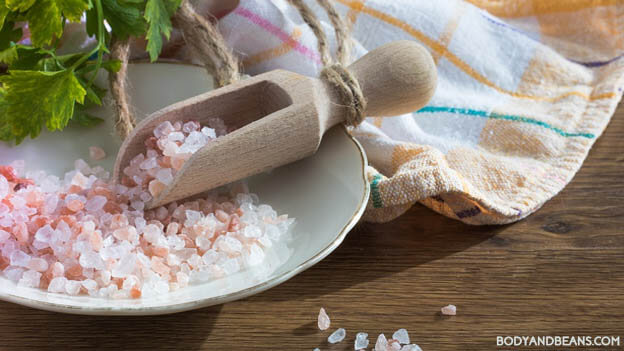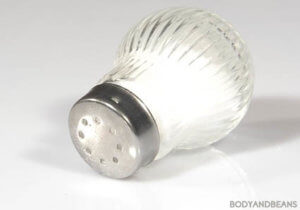Last updated on September 4th, 2018 at 07:26 am
 Life can suddenly become boring without salt. The food you eat would not taste as delicious as it tastes when you add a pinch of salt. Among many tastes, saltiness is probably the most basic taste that we recognize. Salt is one of the most essential minerals (sodium chloride), which our body requires. Most of our food is prepared and preserved with salt. And eating salt has become a habit, and we can’t do without adding salt to taste, while cooking and or preparing side dishes or main course meal.
Life can suddenly become boring without salt. The food you eat would not taste as delicious as it tastes when you add a pinch of salt. Among many tastes, saltiness is probably the most basic taste that we recognize. Salt is one of the most essential minerals (sodium chloride), which our body requires. Most of our food is prepared and preserved with salt. And eating salt has become a habit, and we can’t do without adding salt to taste, while cooking and or preparing side dishes or main course meal.
There are studies backing that excess use of salt may be harmful and may cause cardiovascular diseases like blood pressure. But at the same time there are studies recommending minimum salt intake. Salt helps in transporting nutrients in and out of our cells and tissues. Salt is also essential for muscle contraction and our heart to function properly.
Sodium and potassium are essential nutrient (minerals) for our body. Minimum 500 milligrams of sodium is what our body requires. And salt (sodium chloride) is the main source of sodium in our body. 100 grams of table salt provide around 38,758 mg of Sodium and 8 mg of potassium.
According to WHO guidance of consuming dietary salt and potassium
A person with either elevated sodium levels and low potassium levels could be at risk of raised blood pressure which increases the risk of heart disease and stroke.
There is a lot of talk and confusion about eating salt and hence this post. And if you have any confusion about eating salt and not sure whether eating salt is good for health or its bad, then this is the post worth reading. We’ll look at everything and try and understand whether eating salt is good or bad and discuss much more about eating salt.
Fact about salt and its varieties
There are many varieties of salt available in the market. Salt in its basic form is usually called as the rock salt. Salts are usually produced through processing in salt mines or by evaporating the sea water. Salt is not only used for consumption by human, but also for chemical and industrial use. Edible salt prepared in salt mines may have to be iodised to prevent iodine deficiency.
The best variety of salt which is beneficial for health is unrefined salt as it is rich in trace minerals and also devoid of additives.
Here are some of the varieties of salts.
Rock Salt
This salt is bit grayish colour and is used for making ice creams. People used to add this salt to maintain the temperature of the ice cream. The rock salt is processed and made edible; you can get it in any supermarket.
Crystallized Sea Salt
The texture of this salt can be coarse or fine and the size of the salt granules will determine how fast it can be dissolved. If the salt is rich in iron, then it will give a slightly reddish or pinkish colour. You can add this salt in salads and sausages.
Kosher Salt
Their texture is coarse, and the smell disperses quickly. It dissolves fast; you can use it in bacon roast to pop corn.
Flaked sea salt
This is soft pyramid flakes, and they can dissolve very fast. You can add this salt while cooking freshly boiled veggies, and this will add a spicy flavor in your food. You can take a pinch of salt, crush the flakes, and then add it in your food.
Pickling Salt
This salt has less nutritional value than other salts; it has less percentages of iodine, so contributes less to the daily nutrition. The texture of the salt is fine grained, and the concentration is high. So, you need to use it in lesser quantities, unlike table salt or kosher salt.
Health benefits of eating salt

WHO recommends, on an average, we should not be eating less than around 5 grams of salt daily. Consuming certain levels of salt daily may benefits your body. But the quality of salt you are eating have to be good like natural sea salt. Here are some of the health benefits of eating natural salt. At the same time, if you are consuming too much of salt, it may cause cardiovascular diseases like hypertension and blood pressure.
Lack of Iodine may cause thyroid
Salt has a high percentage of iodine, and iodine is very much beneficial for the body. Deficiency of iodine in the body can cause thyroid and goiter.
Helps regulate blood sugar
Salt helps in regulating the level of blood sugar. Consuming certain amounts of slat can boost the insulin sensitivity, and thus the blood sugar levels are maintained. A low salt diet causes insulin resistance, and increasing levels of sugar in the body.
Decreases the mortality rates
The Department of Epidemiology and Population Health, Albert Einstein College of Medicine, New York has published a study in the American Journal of Medicine, stating that the intake of salt less than 2300mg can increase the mortality rates. The salt contains sodium which helps in lowering the mortality rates.
Salt is a natural antihistamine
If you are having an allergic reaction or asthma attack, then sprinkle some salt on your tongue, and the situation can be averted.
Boost digestion
Proper intake of salts also helps in improving digestion by maintaining the ideal stomach pH levels. Stomach acids are primarily Hydrochloric acids and the salts means Sodium Chloride. For proper digestion, stomach pH levels have to be maintained.
Hot salt water (natural salt mixed with lukewarm water) can help detoxify your body. If you drink a glass of natural salt water in empty stomach, it simulates bowel movements.
Improves quality of sleep
Salt also helps in improving the quality of the sleep. It boosts up the anti-stress and anti-excitatory hormones, which controls the adrenaline rush, and helps in better sleeping. If you sprinkle some salt on the tongue, then you can avoid the adrenaline peak.
Increases metabolism
Salt also helps in improving the metabolism, and thus put the weight on a check. Salt helps in eliminating the cortisol, which leads to weight gain and slow metabolism. Daily intake of salt helps in reducing the levels of cortisol in the blood, and thus preventing weight gain.
Electrolytes
To keep our bodies to function properly, it needs electrolytes. Electrolytes trigger the thirst mechanism in our body, which enable us to drink water. The water in the body helps in controlling the blood pressure and also the digestion. The salt helps in retaining the water levels in the body for proper functions.
Muscles contractions
Salt helps in muscles contractions, which will help you from cramping. The salt is also beneficial as it prevents the sunstrokes during the scorching summers. Salt also regulates the level of calcium and other minerals in the body.
Sodium deficiency
Lack of intake of salts can lead to sodium deficiency, thus increasing the rates of strokes. During the summers when the body perspires rapidly, then huge proportion of salt is lost, leaving the body dehydrated. For a tropical country like India, intake of adequate amount of salt is essential.
Eating excessive salt may be bad
 Even if there are many benefits of eating salt, you may have to moderate its uses. Consuming too much of salt may be bad for your heart health.
Even if there are many benefits of eating salt, you may have to moderate its uses. Consuming too much of salt may be bad for your heart health.
Consuming more than recommended salt (under 5 grams per day) may result in accumulation of extra sodium. Extra sodium causes the body to retain more water, which in turn will increase the blood volume. Your heart has to work harder to circulate blood and this may cause high blood pressure, which may lead to heart attack.
It’s better to measure your salt intake and use it moderately. The fast food, cheese or many other ingredients are rich in salt. One should be careful while cooking and ensure moderate use of salt.
Different people have different type of body conditions and hence it is better to consult your doctor to find out the exact quantity of salt you should be eating.
Over to you
There are many benefits of salts, it adds taste to the foods, soothes your tongue and also the liver. But the correct quantity of salt has to be consumed daily to enjoy the benefits. Too much salt is also not good for your health.
What do you think; eating salt is good or bad for your health?